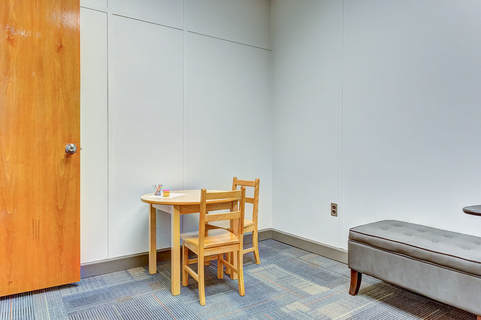Forensic Interviews
Forensic services are provided to children who may have experienced abuse or who have witnessed a crime or other violent act. The primary aim of forensic services is to aid in ensuring the safety of the individual child as well as other children in the community. Forensic services are provided in a safe and child-friendly environment.
 During the interview, younger children sit at the small table, and the older children in chairs.
During the interview, younger children sit at the small table, and the older children in chairs.
A forensic interview is a single session, recorded interview designed to elicit a child’s unique information when there are concerns of possible abuse or when the child has witnessed violence against another person. The forensic interview is conducted in a supportive and non-leading manner by a professional trained in the NCAC Forensic Interview model. Interviews are remotely observed by representatives of the agencies involved in the investigation (such as law enforcement and child protective services).
Extended Forensic Interviews
An extended forensic interview is a multi-session interview conducted by professionals trained in the NCAC Extended Forensic Interview model. Extended forensic interviews are conducted with children currently involved in a criminal or child protection investigation who may experience difficulty relaying their information during a single interview session. Extended Forensic Interviews are done at the request of law enforcement and the Department of Human Resources.
FAQ's
May I be present with my child during the interview or watch with the team? It is important for the interviewer to talk with your child alone. If something abusive has happened to your child, it might initially be difficult for your child to talk about this in front of you. If your child discloses abusive incidents it might be upsetting to you. The team members have the responsibility of observing, assessing and investigating the allegations. The team’s focus must be on your child. Therefore you are not permitted to observe the interview.
Will someone talk with me during the interview? You may bring a friend or support person. The family advocate will provide support while the interview is taking place. It is understandable that waiting for your child may be difficult.
What can I expect immediately after the interview is over? At the end of the interview, the DHR investigator and law enforcement will inform you about what will happen next. Unless told otherwise, you and your child are free to leave after talking with the investigators. The team will meet and develop a plan. An advocate or the DHR investigator may contact you at a later date with more detailed information.
Will someone talk with me during the interview? You may bring a friend or support person. The family advocate will provide support while the interview is taking place. It is understandable that waiting for your child may be difficult.
What can I expect immediately after the interview is over? At the end of the interview, the DHR investigator and law enforcement will inform you about what will happen next. Unless told otherwise, you and your child are free to leave after talking with the investigators. The team will meet and develop a plan. An advocate or the DHR investigator may contact you at a later date with more detailed information.


